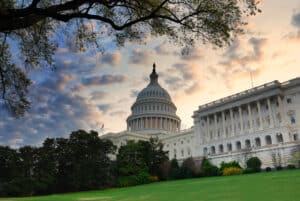WORKERS’ COMPENSATION IN THE FEDERAL GOVERNMENT
 Workers compensation benefits for over fifty million federal employees (including the postal service) is provided by the American taxpayers.
Workers compensation benefits for over fifty million federal employees (including the postal service) is provided by the American taxpayers.
- The federal government is self-insured.
- All federal workers compensation claims are overseen by the Office of Worker Compensation Programs, a division of the United States Department of Labor.
The Office Of Worker Compensation Programs
The Office of Worker Compensation Programs has four areas of responsibility. They are:
- Division of Federal Employees’ Compensation Act
-
- The Division of Federal Employees’ Compensation Act overseas almost all of the federal employees’ work comp claims.
- It administers the Federal Employees’ Compensation Act (FECA). FECA provides the same types of benefits as the state work comp acts do:
- Medical benefits
- Indemnity benefits
- Death benefits
- Vocational rehabilitation benefits
- Division of Energy Employees’ Occupational Illness Compensation – handles only claims from the Department of Energy for employees who became ill from work in the production and testing of nuclear weapons.
- Division of Longshore and Harbor Workers’ Compensation – administers claims under the Longshore and Harbor Workers’ Compensation Act, but the employers and employees are not federal employees.
- Division of Coal Miner Workers’ Compensation – administers the Black Lung Benefits Act for coal miners totally disabled by black lung disease(non-federal employees.)
The United States Department of Labor has a world-class safety programadministered by the Occupation Safety and Health Administration which provides all federal departments with safety programs and safety training.
The Workforce Of The Federal Government
The workforce of the federal government is so large that it is a cross section of the world of work comp. There are both low risk and high risk occupations within the federal government. A few of the many types of occupations within the federal workforce includes:
- Printers at the U.S. Mint
- Rangers for the U.S. Forest Service
- Mail carriers for the U.S. Postal Service
- Congressmen in the U.S. House of Representatives
- Astronauts with the National Aeronautics and Space Administration
- Security screeners with the Transportation Security Administration
- Doctors and nurses with the Veteran Administration
- Spies for the Central Intelligence Agency
- Attorneys for the Department of Justice
- Clerical workers in every department and agency
When A Federal Employee Is Injured
When a federal employee is injured on the job or contracts an occupational illness, the employee can select the medical provider of his choice, as long at the medical provider has been previously approved to handle federal workers’ compensation claim treatment.
- A claim is not accepted by FECA unless there is medical.
- The agency may not stop an employee from filing a claim.
FECA Provides Indemnity Benefits For:
- Temporary total disability
- Temporary partial disability
- Permanent partial disability
- Permanent total disability
The indemnity Benefits Are Equal To Either:
- Two-thirds of the employee’s average weekly wage over the previous 52 weeks
- Three-fourths (with dependents) of average weekly wage over the previous 52 weeks.
- Compensation for temporary total disability or scheduled awards may not exceed 75% of the basic monthly salary of an employee at the highest step of the GS-15 level.
- For temporary total disability, it may not be less than 75% of the basic monthly salary of an employee at the first step of the GS-2 level or actual pay, whichever is less.
- There is no minimum weekly benefit amount.
If an employee is able to return to work in a modified capacity, is offered a job, but does not return to work, they are AWOL (absent without leave) and can be terminated and lose all benefits. Many federal agencies are still struggling with how to develop return to work programs.
Transitional / Modified Duties In Federal Government
The Federal Government, excluding the Post Office, is the largest employer in the United States. Jobs range in nature from unskilled sedentary to highly skilled heavy-duty with many jobs falling in between.
If there is an applicable union contract, be sure to review the terms to verify modified duty is not prohibited or restricted. Due to the sheer size and variety of government work, temporary transitional duty should be accommodated the vast majority of the time.
Sample Transitional Duty Jobs In Federal Government
| Office Workers : | Accommodations to allow sit/stand as needed by use of standing desks or one-handed work should be considered. |
| Field Workers: | Accommodations to allow work from home telephonically or at a local Federal Government office should be considered. |
| Attorneys : |
Those unable to attend court proceedings may be able to complete preparatory work from a home office. |

